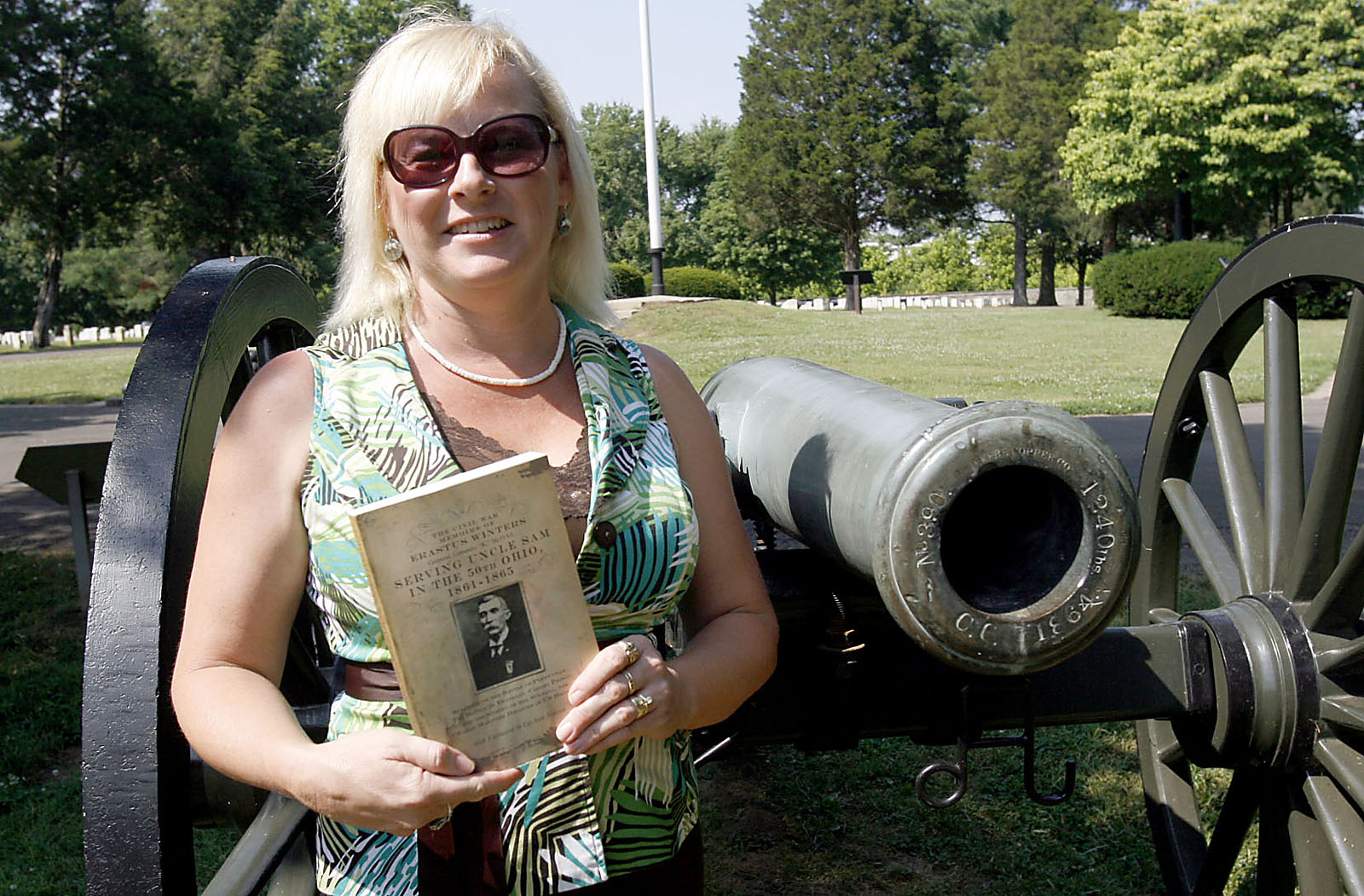FIND THE BOOK"The Civil War Memoirs of Erastus Winters" was published by Cold River Press and released in May. The 300-page softcover book is available at amazon.com, barnesandnoble.com and booksamillion.com.
MURFREESBORO, Tenn. - More than 100 years after his remembrances first were printed, "The Civil War Memoirs of Erastus Winters" have been brought back to life by a Murfreesboro editor.
The memoirs were first published for surviving comrades and Winters' family in 1905. The federal troop corporal had a military life much like the fictional Indiana Jones' private life, the book reveals. Lee Ann Newton wrote the book's foreword and edited the memoirs, but did not otherwise change any of the content.
An executive assistant at Middle Tennessee State University's Tennessee Mathematics, Science and Technology Education Center, Newton has been a history buff for years.
"On family vacations as little kids, we would go to battlefields," the 50-year-old Liberty, Ind., native said. "My first one was Gettysburg."
The co-author of two Civil War-era novels, one completed and the other in the works, was given an old, crumpled copy of the memoirs while doing research for her first novel in her hometown.
Winters served Uncle Sam in Company K of the 50th Ohio from 1861 to 1865. He survived the Battle of Perryville (Ky.), the Battle of Franklin and the sinking of the Sultana, which is the worst maritime disaster in U.S. history.
The Battle of Perryville was fought Oct. 8, 1862, and finalized Confederate Gen. Braxton Bragg's famous "Kentucky Invasion" with a tactical victory for the Confederacy. It also ended in an eventual retreat that set the stage for the end-of-year Battle of Stones River outside Murfreesboro.
"Winters' unit saw battle for the first time, behind the 80th Indiana," Newton said.
Winters also fought in the Battle of Franklin in 1864.
"His description of Franklin was just chaos. He got pinned down in a crossfire between his lines and the Confederates and got captured by a Confederate soldier," Newton said. "Winters was taking fire from Union troops, because he was behind Confederate breastworks."
The soldiers piled up wood, logs and dirt to catch bullets, she said.
Winters escaped, and walked in the dark into what he thought were Union soldiers. But they were Confederate soldiers and he was recaptured, along with others from his unit.
The soldiers were corralled and transferred by open train car to Cahaba prison in Alabama, where Winters stayed until the end of the war. Upon his release from prison, Winters was sent to Vicksburg, Miss., Newton's edited account states. That's where he was put on the steamship Sultana with other prisoners from Cahaba and Georgia's Andersonville prison.
"The [ship] captain had an underhanded deal to take these prisoners to Cairo, Ill., to be mustered out [released from service]," Newton said. "The Sultana wasn't supposed to have over 300 passengers. It was estimated to have over 1,800."
In Memphis, barrels of sugar were put in the ship's cargo area, adding to the weight on the ship.
"One or two miles north of Memphis, a boiler on the ship blows. Then the other two boilers blow," Newton said. "Only 700 survive, including Winters."
History remembers the Titanic tragedy in the early 1900s, but the sinking of the Sultana on April 27, 1865, killed more people. Several other newsworthy events took place during that month, Newton said.
"[Abraham] Lincoln was assassinated two weeks prior to the Sultana [sinking]," she said. "News was focused on that. The front page was about that. To lose 1,100 made a [story about the size of a] matchbox of Harper's Weekly," Newton said. "Also occurring in April 1865 - Lee surrendered at Appomattox, Lincoln was assassinated, the manhunt for John Wilkes Booth ended and Jefferson Davis was still at large."
Rick Vonosdall, professor of education at MTSU, has read portions of the memoirs and plans to read more.
"I think it is amazing to be able to actually read the memoirs of someone who actually lived through that time," he said.
Vonosdall's great-great grandfather, Cpl. Freeman Cary, served in the Union Army in Middle Tennessee during the war.
"What Erastus [Winters] lived through was amazing," Vonosdall said. "Perryville was a terrible battle, then to go through the Battle of Franklin, be imprisoned and live through all those horrendous experiences. Then the steamer Sultana sinks. The fact he survived this and collected the memoirs all together. Newton put them in a form so that not only Winter's story, but the story of all men who lived through those times [could be remembered]."
Winters wrote in his memoirs "Don't forget us."
As Newton corrected spelling in his memoir, she couldn't forget those words.
"I edited the memoirs to honor a promise I made to him as I was doing this," Newton said. "He is not a lost hero anymore."

